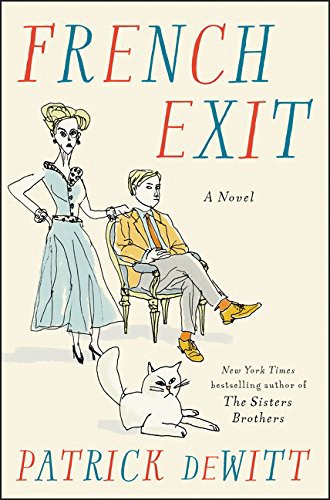interviews
Patrick deWitt Wants to Write Books for People Who Don’t Read Books
The author, of ‘French Exit’, talks about his writing process

Patrick deWitt’s novels all seem different on the surface, but deep down they always feature complex characters with a unique perspective on the world. French Exit is no different.

In his latest novel, the author created two undeniably original characters with strong points of view. Frances Price is a snobbish, wealthy widow who has kept her adult son under her thumb throughout his life. Malcolm lives in a state of perpetual arrested development. They live in the lap of luxury in the Upper East Side; going to parties only to talk poorly of their hosts, dining in only the best of restaurants, and wrapping themselves in the finest clothes.
All of this comes crashing down after a tabloid scandal threatens them with bankruptcy. Through a series of comic moments, coupled with dark, twisted ones, the mother-son duo make their way to Paris to escape all of their troubles, but their troubles are nipping on their heels page in and page out of this hilarious and tragic novel.
I spoke with deWitt prior to his fourth novel’s release about balancing humor and tragedy.

Adam Vitcavage: Something I love about your writing is that you write these very serious dramatic works with such humor and wit. What’s harder for you: writing a tragic scene or trying to make a reader laugh?
Patrick deWitt: Writing a straight dramatic scene. If the purpose of the scene is to evoke a sense of sadness in a writer, I feel that is more challenging than making them laugh or smile. I don’t think that is a universally held truth. It’s a personal thing for me since humor has come naturally for me. I used to try to suppress it in my writing. I have a natural inclination to write humor.
I would say I have a mishmash of the two in my writing. I have things to say and scenes I want to write that are morose, but I always have some gag of levity.
AV: How did you arrive at that realization that you can do both in your writing?
PW: Through reading people like Charles Portis. I remember specifically reading him and realizing humor can be high art. Now there are examples of it everywhere. In high school, I remember reading Portis and his intelligence is on every line, but his humor is also evident. He was one of those people that made aware that there are different personalities in writing. My interest has room for all of those emotions in any given work.
AV: How conscious are you on balancing the light and the dark from page to page?
PW: Maybe not on a page to page level, but more in terms of scenes. Really in terms of the entire project. All of my books are measured out in the same way. Maybe 60% humor and 40% tragedy. It’s not something I think about on a sentence or page level. Just the general taste.
With my new book, I was surprised by the feeling of it being somewhat lighter than I intended. It’s pretty breezy. I didn’t intend to do that, but these things tend to move around on their own.
AV: On the title page once you open this book it says, French Exit: A Tragedy of Manners. What’s that mean?
PW: I was describing the book to myself as a Comedy of Manners, which is my current favorite style of writing. It’s something I steep myself in as a reader over the last couple of years. I love ridiculous conversation in real life and my fiction. My book follows that, but then takes a turn. There’s a tragic event near the end of the book that I didn’t necessarily see coming and it altered my perception of what the book was and what it was for.
The Comedy of Manners didn’t make sense. So I came up with a Tragedy of Manners. I thought I made it up and I thought it was so clever. Then I was reading A Legacy by Sybille Bedford and in the introductions I saw the phrase. I was beat by a couple of years to think I came up with the phrase, but I still think it fits the book.
REVIEW: The Sisters Brothers by Patrick DeWitt
AV: The book opens with a very distinct scene with our two main characters and a homeless man. Then right before the coda, we end with a very dark scene. Were either of these scenes in your mind from the very beginning?
PW: The way I tend to work is that I usually have a s scene in mind. Ideally, this would be the beginning of the book, but it doesn’t necessarily have to be. I’m not one for plotting or planning things out. Whenever I do it seems to be a waste of time because I change my mind. In terms of time management, I don’t do it. I also like to not know what’s next and where I am going. It’s a big plus of the job for me to have a mystery of what comes next.
I did have that opening scene in mind. I imagined these characters leaving a party proclaiming they have some pressing engagement to attend to, but then they just end up sitting on a bench where they just rip everyone they’ve been socializing with apart. I wanted to explain their complex personalities in the shortest amount of space possible.
I had that idea and it came out how I hoped. That doesn’t happen every time, but it gave me hope this idea could go the distance and become a book.
As for the ending, I didn’t intend it to be that dark, but I knew I didn’t want it to be bubbly. I wanted some ugliness or darkness in there to level things out and make it. I didn’t come to that decision lightly and I have complicated feelings for doing what I did. I feel my motivation is sound and it served the story.
I want to write books for people who don’t read books.
AV: What do you think about on a day to day basis?
PW: I tend to go by scenes. Because it’s such a dialogue heavy book, I think about conversations. The plot is pushed through via these conversations. I just get characters going. I need characters who have something to say. The mother and son have spent their entire lives together and they are complex and curious. They have a lot to say.
Once I get characters gabbing, I need to figure out how to get the story across. I don’t want every line to feel like the reader is being fed biographical background because then the reader will figure out what the author is doing. I start with a lot and then cut away, cut away, and cut away until there is the bare minimum of information that is still effective.
There’s a note of ridiculous, black humor in all four of my novels.
AV: Your other novels have been vastly different on the surface. What do you feel ties your work together? What’s a Patrick deWitt novel?
PW: In thinking about all of my books, it is clear to me that they all come from the same place. The characters and settings are different, but that’s just dressing. The tone to me are all the same. There’s a ridiculous, black humor tone. That’s really the through line to me. That note is hit in all four of my novels.
AV: One phrase that has popped up in reviews of all your works and even in some of the pre-release talks regarding French Exit is “off-beat.” Are you off-beat?”
PW: No, I think I’m a pretty Regular Joe. I like the idea of subversion, but I am not a naturally subversive person. I am not interested in upsetting anything or causing offense. If it happens, than I accept it. I feel my goals are pretty wholesome though. I want to entertain. I want to write for everyone. I want to write books for people who don’t read books.










